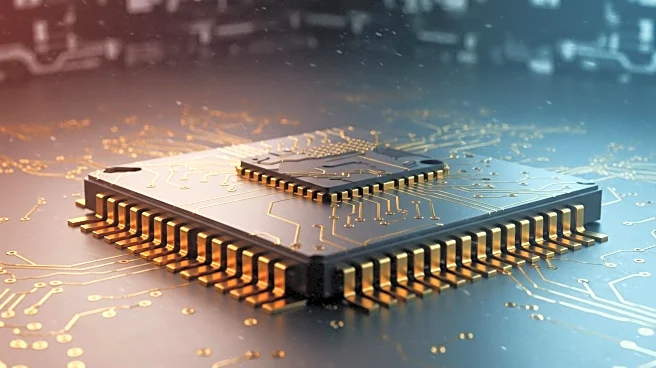What is the story about?
What's Happening?
President Trump announced a deal for the U.S. government to acquire a 9.9% stake in Intel, valued at $8.9 billion. This investment is part of a broader strategy to enhance the domestic semiconductor industry, with funds sourced from the CHIPS Act and the Secure Enclave program. The deal involves purchasing 433.3 million shares at $20.47 each, a discount from Intel's closing price. The government's stake is passive, with no board representation, but it aligns with Intel's board on shareholder matters. This move follows President Trump's meeting with Intel CEO Lip-Bu Tan, amid previous tensions over Tan's ties to Chinese firms.
Why It's Important?
The U.S. government's investment in Intel is a strategic move to strengthen the domestic semiconductor industry, reducing reliance on foreign production and addressing global supply chain vulnerabilities. By supporting Intel, the government aims to secure technological leadership and create high-paying jobs within the U.S. semiconductor sector. This investment also reflects a broader trend of increased government involvement in private markets, particularly in strategic industries. For Intel, the capital infusion provides an opportunity to address its financial challenges and compete with industry leaders like Nvidia and Taiwan Semiconductor Manufacturing Company.
What's Next?
Intel is expected to use the investment to expand its manufacturing capabilities and enhance its competitive position in the semiconductor market. However, the company's ability to regain its market share remains uncertain, as it continues to face challenges from more advanced competitors. The government's passive stake may also influence Intel's strategic decisions, potentially affecting its operational autonomy. Observers will be keen to see how Intel leverages this investment to drive innovation and growth in the semiconductor industry.
Beyond the Headlines
The U.S. government's stake in Intel raises important questions about the role of government in private sector operations, particularly in strategic industries. This move could set a precedent for future government investments in critical technology sectors, prompting discussions on the balance between public interest and corporate autonomy. Additionally, the deal may have implications for market competition and innovation, as government involvement in private companies could influence industry dynamics.















